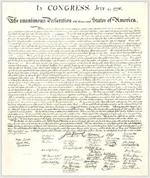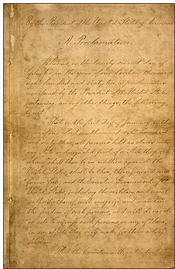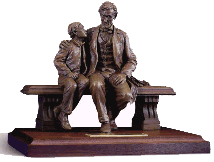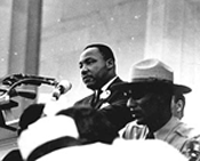|
Abraham Lincoln is considered one of the nation's greatest presidents. As a nation is often judged by its heroes, so America should be judged by the character of Abraham Lincoln. 
National Archives Why? In the 21st Century why should we honor Abraham Lincoln? The easy answer is Abraham Lincoln “Saved the Union” and “Freed the Slaves.” But what did that really entail? For Lincoln “Saving the Union” and “Freeing the Slaves” were linked together; “The Union must be preserved in the purity of its principles as well as the integrity of its territorial parts” he once proclaimed. One historian has explained the link between Union and Principles in a story similar to this: Lincoln thought of the United States as a train, a train with 34 cars [there were 34 states in the Union when Lincoln was inaugurated]. If the train was pulled apart, if some of the cars tried to leave the train the cars would overturn losing their cargo. For Lincoln the “cargo” the Union carried was the Principles of the Declaration of Independence: The principles of democracy, liberty, and equality. So in saving the Union Lincoln felt he was saving the Principles of the Declaration of Independence for his generation and for future generations. Lincoln knew that in his time true democracy did not exist in the United States because not every citizen could vote. The nearly four million slaves certainly didn’t have liberty. And not all, including women, had equality of opportunity. But Lincoln felt that if the Union was preserved eventually improvements would be made so that all citizens could vote, all people would enjoy liberty and opportunity. This is reflected in this Lincoln sentiment, “I say in relation to the principle that all men are created equal, let it be nearly reached as we can.” 
National Archives What? What should we remember about Abraham Lincoln? We should remember Abraham Lincoln’s deeds and words. President Lincoln could have chosen to allow the original seven seceding states to leave the Union. Or he could have compromised and allowed slavery to expand to some or all of the western states or even the whole United Sates so the seven states would change their mind about secession. He could have retracted his statement that slavery was morally wrong and should be put on a course of ultimate extinction, therefore, removing, the statement that insulted so many in the seceding states. He didn’t have to call for 75,000 volunteers to put down the insurrection after Fort Sumter was fired upon. He could have continued to fight the Civil War without issuing the Emancipation Proclamation. He could have, as many recommend, rescinded the Emancipation Proclamation when the War was going poorly for the United Sates of America. He could have agreed to an end of the Civil War leaving the slaves in bondage. He didn’t have to use all the might of office of President to influence Congressman to pass the 13th Amendment to the Constitution outlawing slavery. In each of these situations Abraham Lincoln had a choice; Lincoln always chose saving the union with the purity of its principles. These are just some of the deeds we should remember him for. While Lincoln’s words are everywhere maybe this statement that defines what the United States should be is his most lasting influence, “This is essentially a People's contest. On the side of the Union, it is a struggle for maintaining in the world, that form, and substance of government, whose leading object is, to elevate the condition of men---to lift artificial weights from all shoulders---to clear the paths of laudable pursuit for all---to afford all, an unfettered start, and a fair chance, in the race of life. Yielding to partial, and temporary departures, from necessity, this is the leading object of the government for whose existence we contend.” 
How? How do we honor Abraham Lincoln? There are six units in the National Park Service wholly or partially dedicated to Abraham Lincoln: Abraham Lincoln National Historic Site, Lincoln Boyhood National Memorial, Lincoln Home National Historic Site, Ford’s Theatre National Historic Site, the Lincoln Memorial, and Mount Rushmore National Monument. In Illinois alone there are 10 State Historic Sites dedicated to Abraham Lincoln. Kentucky, Indiana, and other states also have state administered sites dedicated to Abraham Lincoln. There are also a number of sites in private hands that are dedicated to Abraham Lincoln. There is a statue of Abraham Lincoln in Edinburgh, Scotland; another in Manchester, England; still another on Westminster Square in London, England; nine statues or busts in Washington D. C.; four statues or busts in Gettysburg, PA; at least seven statues or busts in Springfield, IL; three in Hollywood, CA; and countless others around the world. There are also numerous cities, counties, schools, universities, housing sub-divisions, and businesses named for Abraham Lincoln. 
On August 28, 1963 Martin Luther King, Jr. began his ‘I Have a Dream’ Speech with these words: “Five score years ago, a great American, in whose symbolic shadow we stand today, signed the Emancipation Proclamation. This momentous decree came as a great beacon light of hope to millions of Negro slaves who had been seared in the flames of withering injustice. It came as a joyous daybreak to end the long night of their captivity.”
Sources: McPherson, James. 1991. Abraham Lincoln and the Second American Revolution. New York: Oxford University Press. McPherson, James. 1991. “Who Freed the Slaves?” Abraham Lincoln and the Crucible of War: Papers from the Sixth Annual Lincoln Colloquium. Springfield, Illinois: Lincoln Home NHS. Boritt, Gabor. 1978. Abraham Lincoln and the Politics of the American Dream. Memphis, TN: Memphis State University Press.
|
Last updated: April 10, 2015
